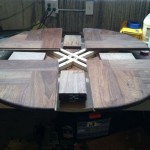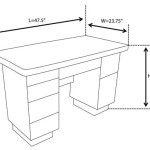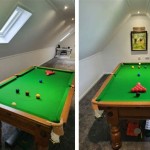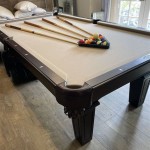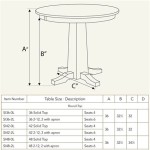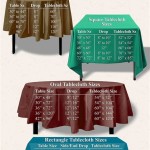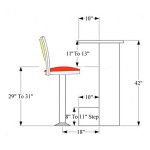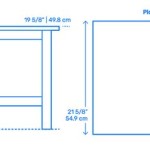What Size Pool Table is Best for Pubs?
The selection of a pool table for a pub environment involves several critical considerations. The dimensions of the playing area, the available space within the establishment, and the type of clientele all play significant roles in determining the ideal pool table size. Unlike residential settings, pubs must balance the entertainment value of a pool table with the practical limitations imposed by the venue's layout and design. This article will explore the different pool table sizes commonly found in pubs and discuss the factors that influence the most appropriate choice.
The standard pool table sizes are typically categorized by the length of the playing surface, measured in feet. The most common sizes are 6-foot, 7-foot, and 8-foot tables. While larger tables like 9-foot models are sometimes seen in dedicated billiard halls or upscale establishments, they are generally less practical for pubs due to space constraints. Each size offers a unique playing experience and presents different challenges in terms of space requirements and maneuverability around the table.
Analyzing Space Availability
The paramount concern when selecting a pool table for a pub is the availability of adequate space. The game of pool requires sufficient room not only for the table itself but also for players to comfortably move around and execute shots. The general rule of thumb is to allow at least 5 feet of unobstructed space around all sides of the table. This allows players to use a standard 57-inch cue without bumping into walls, furniture, or other patrons. Failure to account for this necessary clearance can lead to a frustrating and potentially dangerous playing experience.
To determine the necessary room size, one must add 10 feet (5 feet per side) to the table's length and width. For example, a 7-foot pool table, which measures approximately 3.5 feet wide and 7 feet long, will require a space of at least 13.5 feet long and 8.5 feet wide. It is imperative to physically measure the intended location and carefully consider any obstacles, such as pillars, bar stools, or walkways. These obstacles can significantly reduce the usable space and impact the playability of the table.
In pubs with limited space, strategically positioning the pool table becomes crucial. Consider placing the table in a corner to maximize the use of available square footage. If this is not feasible, carefully arranging furniture and ensuring clear pathways around the table can help mitigate space limitations. Regular rearranging of the pub's layout may be necessary to optimize space and offer players a more enjoyable experience.
Furthermore, accessibility should be addressed. Ensure that the area around the pool table is easily accessible for players with mobility issues. Compliance with accessibility regulations is essential, and providing adequate maneuvering space is a crucial step in creating an inclusive environment for all patrons.
Understanding the Impact of Table Size on Gameplay
The size of the pool table directly impacts the gameplay experience. Smaller tables, such as 6-foot models, are generally easier to play on due to the shorter distances between balls. This makes them suitable for novice players or pubs with a more casual clientele. The reduced playing area also results in faster games, which can be beneficial in a busy pub environment where patrons may be waiting for their turn.
Larger tables, such as 7-foot or 8-foot models, offer a more challenging and strategic gameplay experience. The increased distances between balls demand greater precision and skill. These tables are favored by more experienced players who appreciate the nuances of longer shots and more complex table layouts. The longer duration of games on larger tables can also encourage patrons to spend more time in the pub, potentially leading to increased sales.
The type of games played on the table can also influence the ideal size choice. 8-ball, the most common pool game in pubs, can be played effectively on any table size. However, certain variations of pool or billiard games may be better suited to larger tables. If the pub intends to cater to a more serious pool-playing crowd, a larger table may be a more appropriate investment.
The construction quality of the table is equally important. A well-constructed table, regardless of size, will offer a more consistent and enjoyable playing experience. The quality of the slate, the felt, and the cushions all contribute to the table's playability and longevity. Investing in a high-quality table, even if it is a smaller size, can ultimately provide better value for the pub in the long run.
Catering to Target Clientele and Pub Atmosphere
The demographics and preferences of the pub's target clientele should be a significant factor in determining the pool table size. A pub catering to a younger, more casual crowd might benefit from a smaller table that encourages socialization and faster game turnover. A pub targeting a more experienced or dedicated pool-playing audience may prefer a larger table that offers a more challenging and competitive experience. Understanding the clientele's expectations and preferences can help ensure that the pool table is a valuable asset to the pub.
The overall atmosphere of the pub should also be considered. A smaller pub with a cozy, intimate atmosphere might find that a 6-foot table fits in seamlessly without overwhelming the space. A larger pub with a more open and spacious layout may be better suited to a 7-foot or 8-foot table. The pool table should complement the pub's existing decor and contribute to the overall ambiance.
The presence of other entertainment options within the pub can also influence the ideal pool table size. If the pub already offers other games, such as dartboards or arcade machines, a smaller pool table may be sufficient to provide a diverse range of entertainment options. If the pool table is intended to be the primary entertainment attraction, a larger table may be necessary to draw in a dedicated pool-playing crowd.
Consider the noise level generated by pool playing. The sound of balls colliding and cues striking can be disruptive in a quiet or refined pub environment. Smaller tables tend to generate less noise due to the shorter distances involved. Soundproofing measures may be necessary to mitigate noise pollution, particularly in pubs with sensitive acoustics.
Finally, the ease of maintenance should be a consideration. Smaller tables are generally easier to clean and maintain due to their smaller size and reduced complexity. Regular cleaning of the felt and occasional replacement of the cushions are essential to ensure optimal playability. Larger tables may require more specialized maintenance and may necessitate hiring a professional pool table technician.
In conclusion, the optimal pool table size for a pub is contingent on a comprehensive understanding of the available space, the desired gameplay experience, and the preferences of the target clientele. Careful consideration of these factors will help pub owners make an informed decision that maximizes the entertainment value of the pool table while minimizing potential drawbacks.

Pool Table Room Size Guide Home

Pool Table Room Size Guide Home

What Is A Full Size British Pool Table Liberty

Pool Table Room Size Guide Home

What Is A Full Size British Pool Table Liberty

Pool Tables Size What Is A Full Table

How To Choose The Right Size Pool Table Hamilton Billiards Snooker Blog

How To Choose The Right Pool Table Size For Your Room

What Size Is A Professional Pool Table Home Leisure Direct

Pool Table Room Size Calculator

